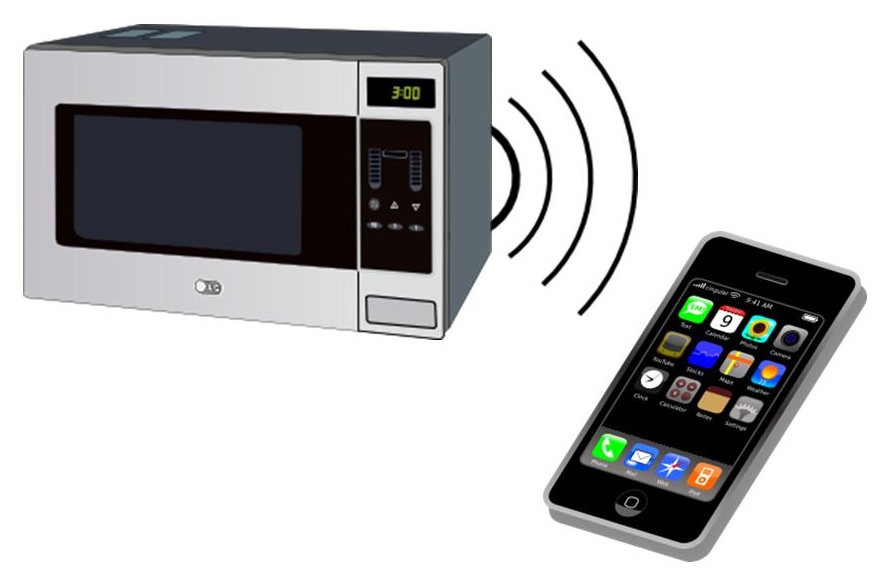Smartphones and tablets might be able to be recharged simply by nuking them.
A recent development from tech scientists has revealed that the microwave oven may soon be used for charging the batteries of electronic and mobile gadgets, instead of just for popping popcorn and nuking leftovers.
In a joint project between two educational institutions, this technology may one day be available.
The researchers were from the Institute of Technology in Georgia, as well as from the University of Tokyo. Together, they have come up with the initial form of a device that can gather and store microwave energy from the standard kitchen appliance, so that it can be used to charge the batteries in mobile gadgets.
This could make it very fast and easy to charge gadgets and is very promising for new technologies.
 According to a statement in a paper by Yoshihiro Kawahara, the leader of the team, “The energy accumulated over two minutes was found to be sufficient for the operation of some of low-power kitchen tools for a few minutes and operate wireless sensor node for 2.5 hours.”
According to a statement in a paper by Yoshihiro Kawahara, the leader of the team, “The energy accumulated over two minutes was found to be sufficient for the operation of some of low-power kitchen tools for a few minutes and operate wireless sensor node for 2.5 hours.”
That said, the team did acknowledge that the charging gadget still requires some work in order to perfect it, as the energy that was stored within the capacitor after the two minutes had passed “was only 15 percent of the ideal case.” The team explained that it may also be able to better the energy accumulation from the leakage that escapes microwave ovens “by using more sophisticated impedance matching and power management methods.”
In another report on the technology, it was revealed that the machine that was built by the team is able to collect the wasted microwave oven energy for charging electronic gadgets. It snatches up the escaped energy that is produced while the device is running for heating up food. It functions by picking up the excess energy through an antenna in the harvester, so that it can then be channeled into other devices such as smartphones or MP3 players. The technology still requires perfection or the microwave would need to run for a very long amount of time to be able to collect any worthwhile amount of charge for the device batteries.
New report sheds light on the success being seen in mobile commerce
Leading market research firm eMarketer has released a new report concerning the state of the mobile commerce sector. The report highlights various aspects of the mobile commerce space, shedding some light on the factors influencing its growth and the challenges it faces around the world. Mobile commerce has been seeing strong growth over the past two years as consumers become more integrated with mobile technology. The proliferation of smartphones and tablets has exposed consumers to a variety of mobile services that they are showing a great deal of enthusiasm for.
Mobile sales expected to reach $133 billion by 2017
According to the report from eMarketer, mobile commerce now accounts for a sizeable portion of the retail sales being recorded in the U.S. The report estimates that mobile sales will reach $41 billion by the end of 2013, a 68% increase over the level they had been in the previous year. By 2017, the report suggests that mobile sales will balloon to $133 billion. Consumers appear to favor mobile commerce because of the convenience that it represents and it is becoming increasingly common for consumers to use their mobile devices to purchase products even when they are already in physical stores.
 Tablets are more popular than smartphones
Tablets are more popular than smartphones
The report notes that tablets have become more popular for mobile commerce than smartphones. While smartphones may be more plentiful among consumers, tablets offer a better shopping experience. Larger screens offer better navigation capabilities and allow consumers to access sites that may not be optimized for viewing on a smartphone. The report notes that nine in 10 consumers are more willing to make a purchase with their tablet than with their smartphones.
Challenges could derail the momentum behind mobile commerce
Mobile commerce does, of course, face significant challenges that could become quite serious in the years to come. Security is expected to remain one of the most problematic issues that faces the mobile commerce sector. Poor infrastructure is also expected to reduce the popularity of mobile payments as consumers run into problems that prevent them from making a purchase with their mobile device.
 According to a statement in a paper by Yoshihiro Kawahara, the leader of the team, “The energy accumulated over two minutes was found to be sufficient for the operation of some of low-power kitchen tools for a few minutes and operate wireless sensor node for 2.5 hours.”
According to a statement in a paper by Yoshihiro Kawahara, the leader of the team, “The energy accumulated over two minutes was found to be sufficient for the operation of some of low-power kitchen tools for a few minutes and operate wireless sensor node for 2.5 hours.”
 Tablets are more popular than smartphones
Tablets are more popular than smartphones